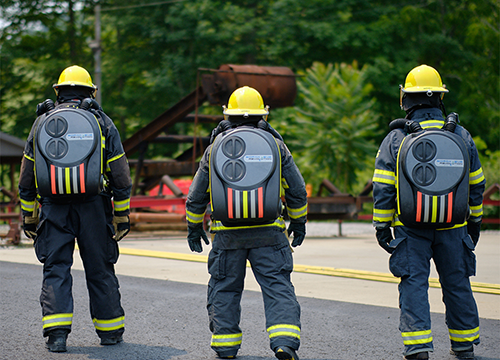BioPak 240R
The high-performance 4-hour SCBA rebreather utilized by top-tier rescue teams globally
- Engineered for 4-hour missions
Ergonomic fit - designed for comfort
- Simple Use and Maintenance - including 'Load and Go' Scrubber

The high-performance 4-hour closed circuit SCBA utilized by top-tier rescue teams globally

The high-performance 4-hour SCBA rebreather utilized by top-tier rescue teams globally
Ergonomic fit - designed for comfort
Closed Circuit Self-Contained Breathing Apparatus (SCBA), also known as rebreathers, are advanced life support systems designed to provide long-duration respiratory protection in IDLH (Immediately Dangerous to Life or Health) environments. By recycling exhaled air, removing carbon dioxide, and replenishing oxygen, these systems enable extended operations of up to 4 hours. Ideal for mine rescue, fire departments, Hazmat, military and law enforcement, a rebreather is essential for missions where time and safety are critical.
Closed circuit SCBAs, often called rebreathers, recycle the user’s exhaled breath by removing carbon dioxide and replenishing oxygen. This allows for extended use (up to four hours or more), making them ideal for long-duration operations. Open circuit SCBAs, by contrast, release exhaled air into the atmosphere and are typically limited to shorter durations (30–60 minutes). Closed circuit systems are more complex but offer significant advantages in endurance and operational efficiency.
A closed circuit SCBA works by capturing the exhaled breath, removing carbon dioxide through a chemical scrubber, and then adding oxygen back into the breathing loop. This “closed” system minimizes gas use and allows the wearer to operate in Immediately Dangerous to Life or Health (IDLH) environments for extended periods, often up to four hours.
Closed circuit SCBAs are used in industries and operations that demand long-duration respiratory protection in hazardous or IDLH environments. Common markets include mining, tunneling, transportation, general industrial, and first responder/military sectors. These users rely on closed circuit systems when safety, endurance, and operational reliability are critical to mission success.
The cost of a closed circuit SCBA varies depending on the features, certifications, and level of customization. Generally, these systems are a higher upfront investment compared to open circuit SCBAs due to their advanced design and longer operational capacity. However, the long-term value—including reduced gas use, lower maintenance needs, and extended service life—makes them a cost-effective solution for demanding applications. Find a distributor for CSE products today.
